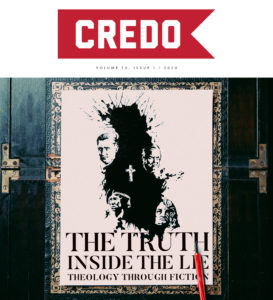Since this issue of Credo Magazine is all about fiction and theology, we’ve included an example of a theologian writing fiction. The following is an excerpt from Douglas Wilson’s new book, Andrew and the Firedrake (Canonball Press, 2019).
*****
“I am glad that I am to return home,” said Andrew. “And I hope that I shall recognize it when I do. But what am I doing here?”
Aelfric bent over the table, reached over and clasped Andrew by the back of the neck. “You come from a line of dragon-slayers. That is the glory of your fathers, whether your parents knew to tell you about it or not. The dragons in your part of the world have all been slain, all but a few, and the rest have hidden themselves away in places like this. Kyru has told you about Fafnir, and how you have been sent here to kill him and rescue the maiden from him. This is why you have been sent to our small world.” 
“Kyru told me this much,” said Andrew. “And I have thought quite a bit about it. What I don’t understand is why a boy like me would be sent from another world to do this when Greenland has many warriors in it, all grown men.”
Aelfric shook his head. “You were chosen, Andrew, but not for your size or age. You were chosen on account of your fathers. Your last name is Wigsen, is it not? You are descended from Wiglaf, who helped Beowulf kill the dragon. That was the first dragon your fathers are responsible for. You have come to this moment the same way that a prince comes to the throne in due time—honestly.”
“I still don’t understand,” said Andrew.
“I can’t fault you,” Aelfric said. “I know that these things are no longer taught to children in your schools, more’s the pity. But a man rarely kills a dragon by himself. When he wins such a great victory, it becomes part of the inheritance he passes on to his sons. In your family line, going back to the time of the great Bede, five dragons have been slain. And each time it happens, a greater measure of authority passes on to the sons. So you may not think you have the strength, or power, or wisdom to attack Fafnir. And this is all true. But you do have the authority.”
Andrew looked across at Kyru with a wry look on his face. “I don’t know how to kill anything with authority. Especially a dragon.” Looking back at Aelfric again, he asked, “But I will go if you say I should. What counsel do you give me?”
“It is good,” Aelfric said. “My counsel is this, and you will not understand what I say until you come within sight of the ruined castle where the dragon dwells. Remember what I say, even if you puzzle over it. First, the dust of the earth shall bite the dragon, and nothing else. Second, the treasure the dragon has stolen belongs to the Kale, and not to the men of the longboats. It must therefore come at the last to them, but it must be bequeathed through a riddle. And third, the peasant girl you will save is a great lady. You must speak the truth to her despite appearances. She will go.”
“You are right about me not understanding,” Andrew said. “But I think I can remember this. The dust will bite the dragon and nothing else. A riddle will enrich the Kale. And the girl is a great lady, despite what I might think.”
You have heard me well,” Aelfric said. “Repeat these to yourself as you walk along the road, as you lie down, and as you rise up. Keep them before your eyes. All depends on it.”
“Why does Fafnir hold the girl? Is she his hostage?”
Aelfric shook his head no. “Fafnir has taken the girl hostage because this is how the story goes.”
“You make it sound as if we in this story have no choices at all.”
“No, we have choices, and we make them constantly,” Aelfric said. “We have a great array of choices before us, and it is our glory to choose between them. But there is one choice we do not have, and that is the choice to be the author of the story. So Fafnir has chosen what he wants. He does not want to eat hay or become a weaver. He is a dragon so he wants to hoard gold, and capture maidens. You are Andrew, and your fathers were great in the kingdom, and so you want to kill the firedrake. And Fafnir wants you to come. It is not that dragons suffer only losses. There are bones of other warriors bleached outside his castle walls. If you are faithful, you will not join them there. But Fafnir does not know whether you will be faithful or not. That is why he wants you to come. He is very subtle, and you must guard yourself against lies above all else. His fire, his teeth, his wings . . . are nothing to his lies.”
“How do I guard myself against lies?”
“The first and best way is to avoid speaking with him at all. But sometimes it can’t be helped, and you must speak with the dragon. If that happens, remember at all times that he has been deceiving sons of Adam for centuries. He knows how to poison your ears. You will never win a debate with him. You must kill him, or die in the attempt.”
Andrew tore off another piece of bread, and ate it slowly. “This is wonderful bread,” he said.
“It is indeed,” said Aelfric. “But when the dragon is speaking, it will seem to you then that this bread was made from sawdust. Our words to you will seem full of malice. The water in this pitcher will be remembered as foul. And when you enter that great darkness, do not doubt in the dark what you knew in the light.” Do not doubt in the dark what you knew in the light Click To Tweet
Andrew looked up at Aelfric. “When should we leave?”
“At daybreak tomorrow. We will give you all the supplies you need, and a comfortable bed for the night. The castle is another week’s journey to the West, if you are not interrupted with any other adventures.”
“Thank you,” said Andrew. But suddenly afraid, he looked at Kyru. “Are you still coming with me?”
Kyru neighed richly. “I must. But even if there were no constraint upon me, I still would.”


